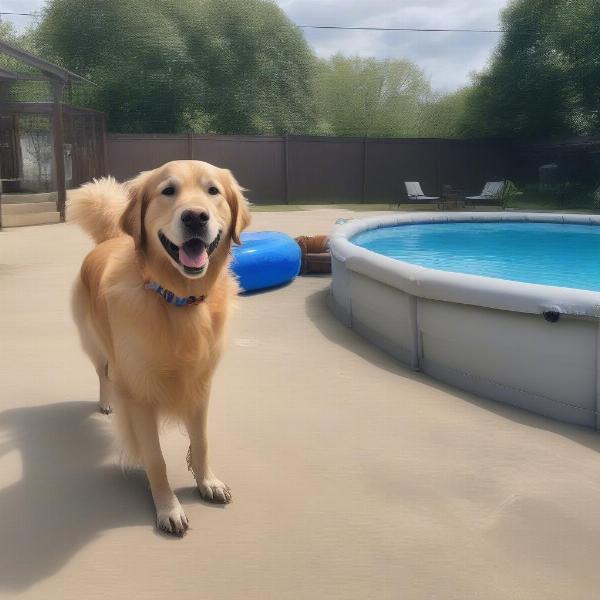Owning a large dog comes with unique joys and challenges, and when summer heats up, providing a way for them to cool off becomes essential. Pools for large dogs offer a fantastic solution, allowing these big companions to splash, play, and beat the heat. Choosing the right pool, ensuring safety, and maximizing the fun are crucial aspects of creating a positive water experience for your furry friend.
 Large dog enjoying a swim in a pool
Large dog enjoying a swim in a pool
Choosing the Right Pool for Your Big Buddy
The sheer size of a large dog necessitates a pool that can accommodate their length and weight. A small kiddie pool simply won’t cut it! Consider durable options like hard plastic pools specifically designed for dogs or larger, more robust inflatable pools. Look for features like reinforced sides and non-slip bottoms to prevent punctures and ensure stability. For extra-large breeds, a pool platform for dogs can be a great addition to a standard pool.
Material Matters
Hard plastic pools are known for their longevity and resistance to damage, making them a wise investment for energetic large dogs. Inflatable pools, while more affordable, require more care to prevent punctures. Look for pools made from puncture-resistant PVC or other durable materials.
Size and Depth
Measure your dog’s length and height to determine the appropriate pool size. The pool should be long enough for them to stretch out comfortably and deep enough for them to enjoy a good splash without touching the bottom.
Ensuring Safety in and Around the Pool
Water safety is paramount, especially with large dogs who may not be natural swimmers. Introduce them to the pool gradually, using positive reinforcement and encouragement. Never force them into the water. Supervision is key, especially during the initial stages of pool acclimation.
Life Vests for Large Dogs
Consider investing in a well-fitting life vest, especially if your dog is unsure about swimming or if you’re near a larger body of water. A life vest provides added buoyancy and security, allowing your dog to gain confidence in the water. They are especially helpful for senior dogs or those with mobility issues. Look for vests with sturdy handles to assist your dog in and out of the pool. You can even combine this with dog stairs for swimming pools for easier access.
Pool Entry and Exit
Provide easy access to and from the pool. Ramps or steps can be helpful, especially for older dogs or those with joint problems. Ensure the surrounding area is non-slippery to prevent accidents. Consider using a shock gate for dogs to keep your dog away from the pool area when unsupervised.
Keeping the Water Clean
Regularly clean the pool to prevent the buildup of bacteria and algae. Use pet-friendly cleaning products to avoid irritating your dog’s skin. Rinse the pool thoroughly after cleaning.
Maximizing the Fun: Pool Activities for Large Dogs
A pool can be more than just a place to cool down; it can also be a source of entertainment and exercise. Introduce floating toys, play fetch in the water, or even set up an agility course that incorporates the pool.
“Large dogs can benefit immensely from having access to a pool, especially during hot weather,” says Dr. Emily Carter, a veterinarian specializing in canine hydrotherapy. “The low-impact exercise provided by swimming is excellent for their joints and overall well-being.”
Conclusion
Pools for large dogs can be a wonderful addition to their lives, providing a refreshing escape from the heat and a fun way to exercise. Choosing the right pool, prioritizing safety, and incorporating engaging activities can ensure your large dog enjoys a safe and enriching water experience. Remember to always supervise your dog around water and take necessary precautions to prevent accidents.
FAQ
- What type of pool is best for a large dog? Hard plastic pools are generally more durable, while inflatable pools are more affordable.
- How do I introduce my large dog to the pool? Gradually and with positive reinforcement. Never force them into the water.
- Is a life vest necessary for a large dog? It’s highly recommended, especially for dogs who are not strong swimmers or for use in larger bodies of water.
- How often should I clean my dog’s pool? Regularly, especially during frequent use, to prevent bacteria and algae growth.
- Can I use regular pool chemicals in my dog’s pool? No, use only pet-friendly cleaning products.
- What kind of toys are suitable for dogs in pools? Floating toys, such as balls or frisbees, are ideal.
- How can I make the pool area safer for my dog? Provide ramps or steps for easy entry and exit, ensure the surrounding area is non-slippery, and always supervise your dog.
ILM Dog is a leading international pet website dedicated to providing expert advice on dog care and well-being. We offer valuable insights into breeds, health, training, nutrition, grooming, and much more. For expert guidance and personalized advice on finding the perfect products for your canine companion, contact us at [email protected] or call +44 20-3965-8624. Visit ILM Dog for all your dog-related needs.